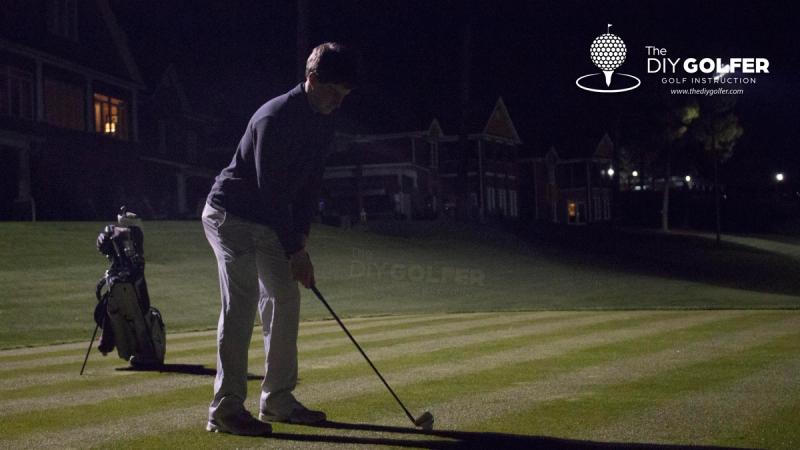Table of Contents

Last updated Nov 06, 2023
Go Low in Golf: Are you Fearful of Shooting Under Par?
Learn the technique that allows you to conquer your fear of playing good golf once and for all!


You make the turn to the back nine after shooting your career low on the front. The 10th hole is a tight par 4 with O.B. on the right side, and a small pond down the left. You begin to think about all of the possibilities, remember how many times you have choked good rounds in the past, and notice an intense fear inside your body.
You get lost in compulsive thought about how you need to "break through" and shoot a good round, but unfortunately, you step up on the tee and hit it out of bounds.
Your heart sinks, and you realize how you've ruined another good round. For the next 8 holes, all you can think about it how you screwed up the 10th hole, and "did it again."
You mentally rehearse all of the previous times that you "blew it" like you were studying for a big exam. The thoughts never seem to leave, and they eat away at you overnight.
Then, a few days later, you are back to your normal "motivated self," busting your butt trying to figure out how to improve your game again.
You want more.
In this post, I want to discuss the topic of fear as it applies to playing good golf. We all say that we want to play good, so why do we try so hard to screw it up for ourselves?
Well, I hate to say, but the solution to this problem does not come to you in one day.
The good news?
You can overcome it. It may seem impossible to you right now, but I know you can overcome it, because I did. I once stood on the 10th tee after shooting 3 under on the front nine with thoughts that spiraled out of control. Now, I rarely even realize that I am on the 10th hole.
Before I tell you the solution to this problem, I would like to point out what I believe is the root cause of FOPG (fear of playing good). If you can understand it, you will soon be on a path to overcoming that back nine panic.
Lack of Presence
The root cause of FOPG as golfers is due to our lack of awareness for the moment we are currently in. Instead of stepping on the 10th tee, teeing it up, and hitting it down the middle, we instead create all sorts of "stories" inside our heads.
In the moment, these stories sound plausible to us, because we have identified with them so closely. We ACTUALLY BELIEVE thoughts such as:
- "Here it comes again.. I'm about to fall apart"
- "My mind is always getting in my way. I hate my mind"
- "I'm not a good golfer. I had some lucky breaks on that front side."
- "My playing partner is probably freaking out about how low I shot on the front nine. I wouldn't want him/her to see me choke"
- "My clubs are not right for me. I can't continue to play good with these clubs"
What we never realize (until a few days later) is how irrational these thoughts are. Instead, we enter a dreamlike state, where we don't consciously realize that our thoughts do not represent reality.
When we do not realize that our thoughts are illusions of reality, we identify with them, and then, they cause physiological responses in our bodies, which in turn causes us to make poor swings on the course. When our body is tense, and overcome by emotional responses, we lose the focus required to play good golf.
You may be skeptical of this proposition:
- "But I am not irrational! I can turn off my brain whenever I want! My thoughts are real, and I know that."
- "It's not that easy. You can't possibly say that coming back to the present moment is the solution to all of my golfing problems!"
- "You don't know what it is like to be in my head! My thoughts are much crazier than you could ever imagine!"
I could go on and on. These concerns may seem valid on the surface, but just stop for a minute..
Aren't these thoughts the same types of thoughts that screw you over on the golf course?
If I asked you right now to stop thinking for 30 seconds, would you be able to? Give it a try!
Hopefully, by now, I have you convinced that your brain is a bit crazier than you perceive. Instead of continuing to try and prove this point, let me cover some of the categories of thoughts that distract from the present moment, and thus cause you to blow up on the golf course:
Mind Reading
This type of thought occurs most often when there are people around you. It involves leaving the present moment, and thinking about what others might be thinking. Even if you are observant, and can read minds better than others, it does not help your cause.
Mind reading takes you away from the present moment, and often leads to more and more thoughts.
Thinking about your past
This type of thought is often the most common in golf. You may approach the 10th tee of your home course, and begin to remember all of the poor shots that you have hit off of that tee before.
Instantly, you are living through your past, and not in the present moment. Some of these past thoughts could cause emotional reactions, such as fear, or anxiety.
This is often why your best rounds come on courses that you have little memories, or good memories on.
Now, you might react to these negative thoughts by becoming angry at your mind, and trying to produce "positive" thoughts out of thin air. Let me tell you, this is useless, because it just causes more resistance to the negative thoughts, which is fuel for their fire. We will discuss more later on taming these negative "memories."
Thinking about your future
This type of thought is primarily concerned with speculation. You may approach that 10th tee, and start to wonder:
- "What if I could keep this round going? I might break my previous record by 10 strokes!"
- "If I shoot a good round, then, my playing partners will expect it of me in the future. I don't know if I want that expectation."
- "Maybe if I shoot a good round today, my entire golf career will be transformed! I will have confidence finally!"
What you must realize is that these thoughts take you far away from the present moment; the task at hand.
Getting mad at your thoughts
As I mentioned briefly earlier, some thoughts will cause you to get mad at yourself. Maybe you had a good round going, and all of a sudden a negative thought pops in your head.
Instead of letting that thought come and go (just like many other thoughts do), you choose to hold on to it. Once you decide to hold on to that thought, you then become angry that you can't get rid of it.
But all the while, your resistance to the thought is the very reason you cannot get rid of it!
How to Stop Thinking on the Golf Course
I have just explained the root cause of FOPG, but how does one go about fixing it?
The first step in fixing this problem is recognizing that thoughts are perpetually flowing into your mind, and not all of them should be taken seriously.
The next step is to recognize that you will NEVER stop thinking. Instead of trying to stop your thoughts, you must learn to accept them. By accepting them, you will be able to let them come and go, just like cars driving down a busy road. If you decide to latch on to one of those cars (thoughts), it will drive you far from where you are standing (lack of presence). The longer you hold on to the car, the further you are dragged away from the present moment, and the harder it is to get back.
The problem is, most golfers must experience this type of relationship with their mind rather than just read about it. In theory, it makes sense to disallow your thoughts from taking control of you. But in reality, it is much easier said than done.
Here are a few ways that you can learn to "be present" on the golf course, and lose your irrational fear of shooting low:
Take a step back
Not in a literal sense, but a metaphorical sense. Next time you notice that you have started to think negatively, take a step back in your mind. Instead of getting caught up in the thoughts, just watch them. Watch them as if you were watching cars drive by on the highway. They come, and they go.
It might sound a bit confusing to "watch your thoughts," partly because many golfers (and people in general) truly believe that they ARE their thoughts.
If you have not experienced the sensation of watching your thoughts before, it may not make sense. That is okay. Keep trying, without judgment.
Toss a Golf Ball
If you can't successfully watch your thoughts, toss a golf ball in the air. Do this over and over.
While tossing the golf ball in the air, you are coming back to the present moment. This will help clear some of those negative thoughts.
Affirmations during the round
This completely depends on the golfer. It may or may not work in your favor, but I have found it useful in my game.
If your mind is out of control, and you can't seem to disidentify with your thoughts, repeat something in your head over and over.
Personally, I will choose a score that I believe is challenging, yet possible for that given day, and I repeat it over and over and over. Even when I am playing good, I repeat it.
This almost works as a "mantra" and subconscious primer that clears negative thoughts, while fixing a good outcome in my mind.
Many golfers may cringe at thinking about score during a round, and claim that it is not "process oriented" enough.
But I might say, there is a distinct difference between worrying about score, and using score as an affirmation. When used as an affirmation, you are not thinking about anything else but that very number that you want to shoot. If this number in your head causes you to think about various other things, then maybe it doesn't work for you.
An affirmation does not have to be a score in your mind though. It could be a process goal such as: "pick a specific target on every shot today," or "react to every outcome neutrally."
You can repeat this over and over in your head as well, with the same effect.
Meditation
I saved this point for last, because many golfers are not interested in meditation as a practice. They wonder how sitting in a chair for 15 minutes every day could possibly help their golf game??
I have been practicing mindfulness meditation every day for the past 2 years, and can honestly say that it has been the best thing I have done for my golf game (and life). By learning "mindfulness," you are learning how to watch your thoughts, and be in the present moment.
Although mindfulness meditation has been accepted more and more in the west as of recent years, it still scares people away due to its previous association with Buddhism, and other "spiritual" practices.
If you can keep an open mind, I believe that it could benefit your golf game tremendously, and allow you to stop fearing the low number.
It is the ultimate "mind control" vehicle for improvement. After several months (I know, intimidating) of practice with it, you will find yourself on the 10th tee one day wondering why you ever took this game so seriously :)
Concluding Remarks
Golf is a humbling game, and a great teacher of life. Through diligent practice, you WILL overcome your mind, and be free to shoot low scores.
Most mental game books offer temporary solutions to negative thought patterns on the golf course.
This post is offering you a long term (which also requires constant practice) solution to your "thinking problem."
The results won't show up immediately, but if you are patient enough (not many people are), your golf game WILL improve.






